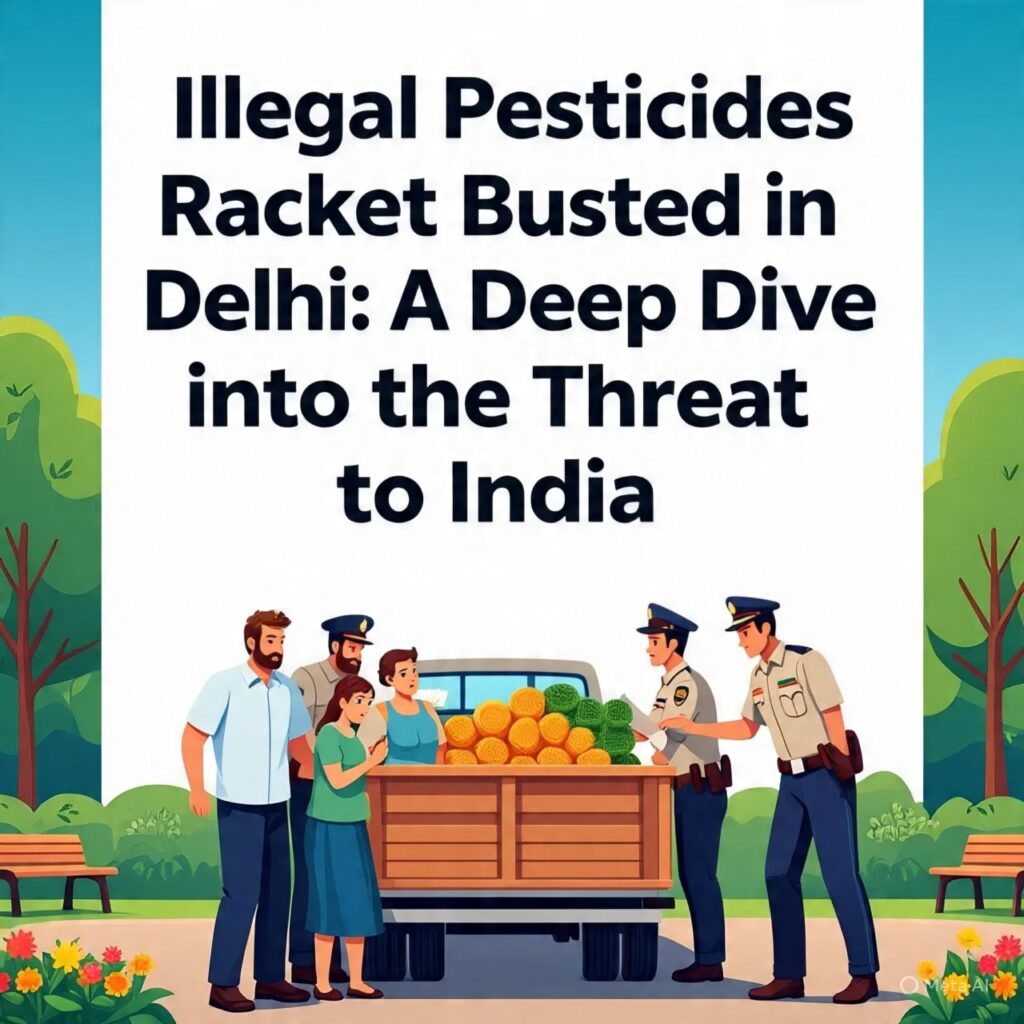
In the heart of India’s capital, an illegal pesticide racket has been unearthed that reveals a worrying side of the agro-input supply chain — and a hidden threat to millions of unsuspecting farmers. In early July, the Delhi Police, working alongside the Agriculture Department, raided a godown in Alipur on the city’s northern fringes. What they found inside was shocking: over 3.2 tonnes of unlicensed, potentially hazardous pesticides ready to be sold to farmers during the ongoing Kharif cropping season.
Four men, including the warehouse owner, have been arrested. The accused — identified as Parveen (the warehouse owner), Manoj Kumar Yadav (45), Rahul Kumar Yadav (22), and Shati Narayan Yadav (24) — were allegedly operating this illegal business for nearly two years, repackaging and selling banned or fake pesticides to local markets under the guise of legitimate brands.
How the Racket Worked
According to police reports, this racket did not just involve storing banned chemicals — it involved sophisticated repackaging and labeling to make these products look like trusted brands. Investigators say the seized chemicals were packed in bags designed to resemble genuine, licensed pesticide brands. Labels falsely indicated they met regulatory standards, hiding the fact that these products were neither approved nor safe.
The godown in Alipur was functioning as both a storage unit and an illegal repackaging hub. Workers, employed as daily-wage laborers, handled the chemicals without proper protective gear or knowledge of their toxicity. The intention was clear: to pass off these fake or substandard pesticides to unsuspecting farmers who often buy in good faith, trusting the labels and local suppliers.
How Did Police Crack the Case?
The bust came after the police received a tip-off that large quantities of pesticides were being repackaged and sold illegally. Acting on this intelligence, the Outer North District Police coordinated with pesticide inspectors from the Delhi Government’s Agriculture Department to plan a raid.
On July 9th, officials raided the premises near Shivam Dharm Kanta, Khasra Number 713, Alipur. Inside, they found hundreds of sacks containing what appeared to be high-grade pesticides. But upon closer inspection, officials realized these were either banned chemicals, old stock relabeled with fake expiry dates, or chemicals mixed in unsafe ratios.
The total value of the seized goods is estimated at ₹3.5 lakh (approximately $4,200) — but the damage they could have caused to crops, soil health, and farmer livelihoods would have been far higher.
The Legal Angle
Based on the evidence, Alipur Police registered a case under Section 29 of the Insecticides Act, 1968. This section deals with penalties for manufacturing or selling insecticides without a valid license, and it carries stiff fines and possible imprisonment.
The investigation has now widened to trace the entire supply chain. Where did the chemicals come from? Who supplied them? Are there more warehouses like this in Delhi or neighboring states? Officials believe this is likely not an isolated incident but part of a larger, organized network.
A Broader Problem: Why Fake Agrochemicals Are a Growing Menace
This raid exposes a problem that has quietly become an annual nightmare for India’s farmers: the sale of counterfeit or substandard seeds, fertilizers, and pesticides.
Every year during the Kharif and Rabi sowing seasons, unscrupulous middlemen and racketeers exploit farmers’ urgency for timely inputs. Fake seeds fail to germinate; counterfeit pesticides either have no effect on pests or, worse, damage entire crops. The result? Poor yields, financial loss, mounting debts, and shattered trust.
In this case, the seized pesticides would likely have been sold to rice farmers in North India, who heavily depend on chemical crop protection during the monsoon season to protect paddy crops from insects, weeds, and fungal diseases.
How Fake Pesticides Harm Farmers and the Ecosystem
The risks of illegal pesticides are manifold:
- Crop Damage
Unregulated chemicals can burn or stunt crops instead of protecting them. Wrong doses or toxic additives may wipe out an entire field. - Soil and Water Pollution
Many banned pesticides contain harmful residues that persist in the soil and contaminate groundwater. Over time, this degrades soil fertility, affecting yields for years. - Health Hazards
Farmers who handle such chemicals without protective equipment risk skin diseases, respiratory problems, and even long-term health complications. Consumers, too, may face food safety risks from residues on harvested produce. - Economic Loss
For marginal farmers, a failed crop means months of wasted labor and investment, and the burden of loans they cannot repay.
Why Fake Inputs Thrive in Rural Markets
Fake agrochemical rackets flourish due to a mix of factors:
• Lack of Awareness: Many small farmers cannot read English labels and depend on local dealers’ word.
• Weak Supply Chains: In remote areas, farmers have limited access to verified agro-input shops.
• High Prices for Genuine Products: Counterfeiters lure farmers with slightly cheaper prices, promising the same results.
• Regulatory Gaps: Oversight is weak at the local level. Many states do not have enough pesticide inspectors to check every dealer and godown.
• Corrupt Networks: In some cases, local distributors knowingly stock fake products because profit margins are huge.
How the Government Is Trying to Fight Back
The Delhi raid is part of a larger push by agricultural authorities to clamp down on such rackets. Recently, India’s Union Agriculture Minister Shivraj Singh Chouhan ordered surprise inspections after complaints of fake seeds in Madhya Pradesh. He personally visited fields to verify whether seeds distributed to farmers were sprouting properly.
State governments have also launched awareness campaigns, encouraging farmers to buy only from licensed dealers and check for approval seals. The Insecticides Act provides for stiff penalties, but enforcing these laws across India’s vast rural landscape remains a challenge.
What Farmers Can Do to Protect Themselves
While authorities tackle the supply side, farmers must also stay vigilant. Here are some practical steps they can take:
• Buy Only from Authorized Dealers: Purchase seeds, fertilizers, and pesticides from government-certified shops.
• Check Packaging Carefully: Look for tamper-proof seals, batch numbers, expiry dates, and valid license details.
• Report Suspicious Products: If a pesticide or fertilizer doesn’t look right or fails to work as promised, farmers should immediately inform local agriculture officers.
• Form Cooperatives: By purchasing in bulk through Farmer Producer Organizations (FPOs), farmers can negotiate directly with reputable companies and bypass shady middlemen.
• Attend Training: Many Krishi Vigyan Kendras (KVKs) conduct training on how to identify genuine vs. fake agro-inputs.
A Wake-Up Call for the Industry
This bust highlights the need for the agrochemical industry to step up too. Leading companies must ensure better supply chain traceability and use modern anti-counterfeit measures like QR codes, holograms, and digital verification.
Meanwhile, digital marketplaces for farm inputs — where verified sellers can be rated and tracked — are emerging as a modern solution to an age-old problem.
The Role of Consumers
It’s not just farmers who pay the price. The ripple effect of fake agrochemicals can reach your dinner plate. Substandard pesticides can leave harmful residues on wheat, rice, vegetables, and fruits. Stronger food safety enforcement and stricter supply checks are needed at all levels — from farm to fork.
Conclusion: A Bigger Battle to Fight
The Alipur pesticide racket is just one link in a much larger chain. As India aims to modernize agriculture, ensure food security, and double farmers’ incomes, the menace of counterfeit inputs must be tackled urgently. This requires strong laws, better awareness, vigilant policing, and, crucially, empowering farmers with knowledge.
When farmers trust the products they buy, they invest wholeheartedly in their fields. They know every drop of sweat they shed will pay back. But when fake pesticides and seeds destroy their crops, they lose hope — and India loses the backbone of its food system.
The Alipur raid should not be a one-off headline but a turning point that pushes India’s agricultural ecosystem to get its house in order.














